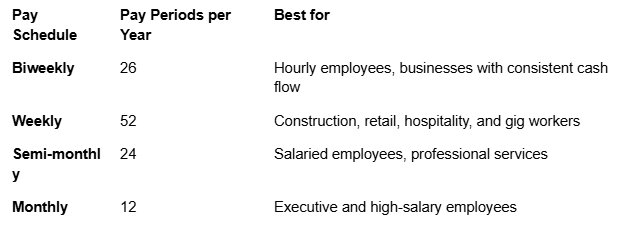What is biweekly pay?
Biweekly pay is a payroll schedule where employees receive wages every two weeks, typically on the same day (e.g., every other Friday). This results in 26 pay periods per year and is one of the businesses' most common payroll structures.
For businesses using Homebase payroll, setting up a biweekly pay schedule ensures consistent paydays, simplifies payroll processing, and keeps employees happy with regular paychecks.
How biweekly pay works
With a biweekly pay schedule:
- Employees are paid every other week on a fixed day.
- Most months will have two paychecks, but two months each year will have three.
- Payroll calculations must account for overtime if employees work more than 40 hours a week.
- Payroll taxes are deducted from each paycheck, ensuring accurate withholdings.
Biweekly pay vs other pay schedules
Employers often compare biweekly pay with other payroll structures to determine the best option for their business:

Pros and cons of biweekly pay
Pros for employers:
- Consistent payroll processing – Easy to plan for payroll costs.
- Simplifies overtime calculations – Aligns with workweeks, unlike semi-monthly pay.
- Improves employee retention – Regular and predictable paychecks.
Cons for employers:
- Two extra pay periods per year – Budgeting must account for the additional payroll runs.
- Higher payroll processing costs – Frequent payroll runs mean additional fees for businesses using third-party services.
- Potential cash flow challenges – Some months may require three pay periods instead of two.
How biweekly pay impacts payroll taxes
Employers must account for tax withholdings when processing biweekly payroll:
- Payroll taxes are deducted from each paycheck, including federal income tax, Social Security, Medicare, and state taxes.
- Employee benefits and deductions (e.g., health insurance, 401(k) contributions) must be divided evenly across 26 paychecks.
- Employers must track hourly workers' overtime hours accurately.
Homebase payroll automatically calculates and processes taxes, deductions, and overtime.
Try Homebase payroll today to simplify payroll processing and tax compliance.
How Homebase helps businesses manage biweekly payroll
Managing biweekly payroll manually can be time-consuming, but Homebase payroll makes it easier by:
- Automating payroll calculations for hourly and salaried employees
- Tracking hours worked to ensure accurate pay
- Handling payroll tax filings to prevent IRS penalties
- Processing direct deposits on time so employees are always paid